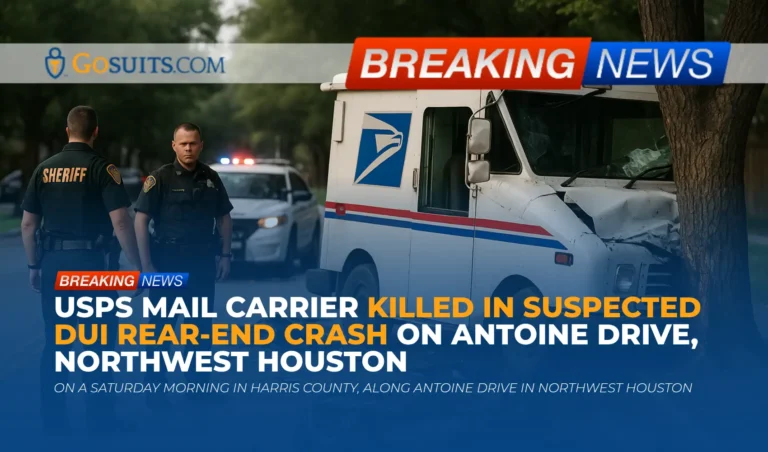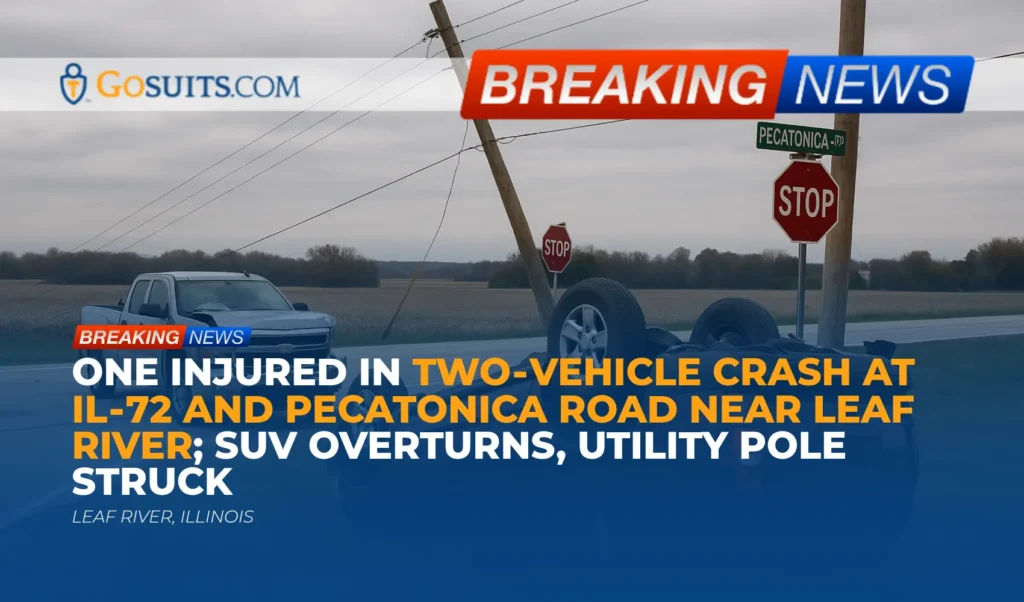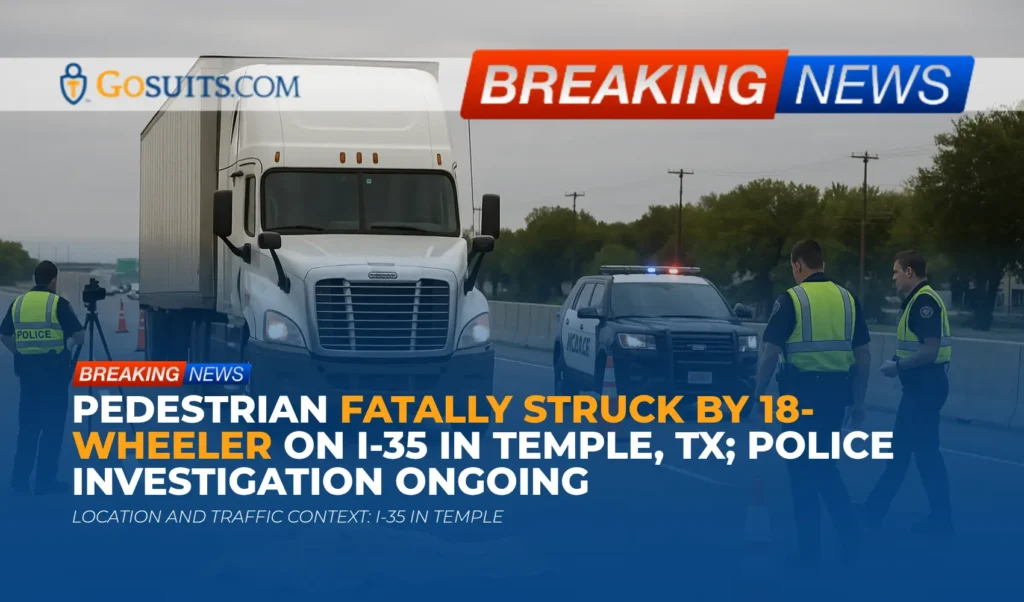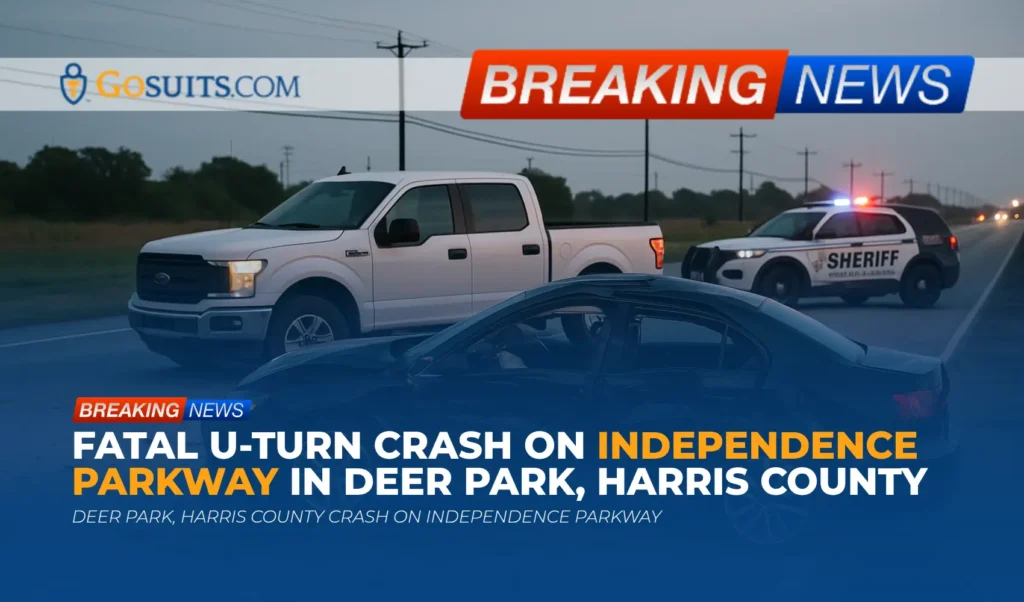- What happened in northwest Houston
- What authorities have said so far
- How traffic fatality investigations typically proceed
- Where families can obtain key records and information
- Civil remedies after a fatal crash in Texas
- Special considerations when the victim is a federal employee
- Insurance and financial responsibility issues
- Evidence to preserve and practical next steps
- Important Texas deadlines and time limits
- Alcohol-impaired driving risks and community safety notes
- Sources and references
- Commentary from Gosuits Houston, Texas Personal Injury Attorney
- Why timely action matters and steps to consider now
What happened in northwest Houston
On a Saturday morning in Harris County, along Antoine Drive in northwest Houston, a long-serving United States Postal Service worker was rear-ended while delivering mail on his usual route. The reported impact pushed the postal vehicle into a tree. The mail carrier, a 58-year-old Marine veteran widely described by neighbors as kind and dedicated, was transported to a hospital and later died from his injuries. A memorial has grown near the crash site as residents express grief and gratitude for his years of service to the community.
Deputies at the scene reported arresting the other driver. According to the sheriff’s office, the driver had allegedly been speeding and had just fled a separate minor crash before losing control and striking the postal vehicle. The driver was reported to be intoxicated at the scene. Authorities have stated that intoxication manslaughter charges were filed, and because the victim was a federal employee on duty, federal charges could also be possible as investigations continue. At the time of reporting, the arrested motorist was held on bond in the county jail.
Family members shared that their loved one served with pride, loved his route, and made a positive impact on many. The U.S. Postal Service publicly offered condolences and counseling resources for coworkers while the investigation proceeds.
What authorities have said so far
Location and timing
The crash occurred along Antoine Drive in northwest Houston, within Harris County. The collision happened on a Saturday morning, and the postal worker was on duty, actively delivering mail on his normal route.
Preliminary account
According to the Harris County Sheriff’s Office account shared publicly, the postal vehicle was rear-ended. Investigators said the striking motorist had fled a prior minor crash, was speeding on Antoine Drive, apparently lost control, and then hit the postal vehicle, sending it into a tree. The mail carrier succumbed to injuries after transport to a hospital.
Criminal proceedings
Deputies indicated the arrested motorist showed signs of intoxication and was charged with intoxication manslaughter. Criminal cases proceed separately from civil claims, though findings and evidence from criminal matters can affect the civil process. Because the victim was a USPS employee on duty, authorities also noted that federal involvement could occur as part of the overall response. No civil liability findings are made at this stage; those are addressed through separate legal processes.
How traffic fatality investigations typically proceed
In a roadway fatality, law enforcement generally secures the scene, documents physical evidence, identifies and interviews witnesses, and may conduct crash reconstruction. Blood alcohol testing and other forensic measures can be part of the investigation where impairment is suspected. Vehicles are often examined for condition and data, including event data recorder information if available. Surveillance footage from nearby businesses or residences may be located and preserved. For fatalities, the medical examiner conducts examinations to determine cause and manner of death and to make findings that can be critical in both criminal and civil cases.
In Texas, official crash reports are created by the investigating agency and filed with the state. These can later be obtained by authorized parties through the state system. Families often find it helpful to gather the crash report, autopsy findings, and hospital records to understand what occurred.
Where families can obtain key records and information
It is understandable to feel overwhelmed after a sudden loss. The following agencies and offices are typical points of contact for records and information related to a fatal crash in Harris County. Processes and eligibility to receive certain records are defined by law.
Crash report and supplemental documents
- Texas statewide crash report system – Eligible persons can request a copy of the Texas Peace Officer’s Crash Report through the state portal. See the Texas Department of Transportation Crash Report Online Purchase System at this TxDOT link. Texas law limits who can obtain unredacted crash reports; see Transportation Code section 550.065 for eligibility and confidentiality rules at this statute.
- Harris County Sheriff’s Office records – The investigating unit may maintain incident reports, photographs, and other material. Requests typically go through the sheriff’s office public information channels. While specific links vary by agency, Harris County and its departments accept open records requests under Texas law.
Autopsy report and medical examiner findings
- Harris County Institute of Forensic Sciences – This is the county medical examiner. Next of kin may request autopsy reports and related findings. Guidance is available through the county’s official site at Harris County IFS Records Requests.
Death certificate
- Texas Department of State Health Services – Certified death certificates are issued by the state. Information on eligibility, fees, and how to order is available at Texas DSHS Death Records.
911 audio, CAD logs, and additional public records
- Open records under Texas law – Audio of 911 calls, computer-aided dispatch logs, and certain investigative materials may be requested through public information procedures. Harris County’s open records process is outlined at Harris County Open Records Requests. Some materials may be withheld or redacted based on statutory exemptions, ongoing investigations, or privacy protections.
Federal coordination in incidents involving postal employees
- U.S. Postal Inspection Service – This federal agency may coordinate with local authorities in matters affecting postal employees and property. See U.S. Postal Inspection Service for general information about its role.
Civil remedies after a fatal crash in Texas
When a life is lost in a traffic crash, the civil side of the law addresses accountability and compensation through two central avenues in Texas: the wrongful death claim and the survival claim. Families do not need to choose one or the other; both may be available in a single case depending on facts and eligible parties.

Wrongful death claim
Texas law permits the decedent’s spouse, children, and parents to bring a wrongful death claim to address harms suffered by the family due to the loss of their loved one. Statutory authority appears in the Texas Civil Practice and Remedies Code, Chapter 71. See the wrongful death statute. If eligible family members do not bring a claim within a set period, the executor or administrator of the estate may sometimes bring the action for the benefit of those family members.
Survival claim
A survival claim allows the decedent’s estate to recover the damages the person would have been able to recover had they survived, such as pain and suffering before death and certain medical expenses. This is also governed by Chapter 71, including section 71.021. See the survival statute.
Potential liability in an alcohol-impaired rear-end crash
- Negligence of the striking driver – Rear-end impacts often reflect a failure to control speed or maintain assured clear distance, and impairment may constitute a breach of ordinary care. Civil liability is determined by evidence, including crash reconstruction, scene documentation, vehicle damage patterns, witness statements, toxicology, and any available video.
- Exemplary damages in Texas – In cases involving gross negligence or malice, Texas law allows for exemplary damages intended to punish and deter such conduct. See Texas Civil Practice and Remedies Code Chapter 41 at this link. In alcohol-impaired driving cases, the facts surrounding intoxication, prior conduct, and level of risk presented can be relevant to whether exemplary damages are available. Courts apply statutory caps and evidentiary standards that vary by case.
- Dram shop liability – If an alcohol-serving establishment overserved a patron who was obviously intoxicated and the intoxication proximately caused the harm, Texas’s Dram Shop Act may permit a claim against the provider. See Texas Alcoholic Beverage Code Chapter 2 at this statute. Determining dram shop liability requires prompt investigation to identify where alcohol was obtained, secure receipts, video, and witness accounts.
Civil cases proceed independently of any criminal proceedings. Criminal outcomes do not control civil responsibility, but evidence from a criminal case can influence a civil matter. Families should be cautious about relying solely on criminal timelines when assessing civil rights and deadlines.
Special considerations when the victim is a federal employee
The postal worker was on duty in a USPS vehicle, which triggers federal employment protections and processes in addition to Texas civil law.
FECA benefits for survivors
Federal civilian employees are covered by the Federal Employees’ Compensation Act, administered by the U.S. Department of Labor. In line-of-duty fatalities, FECA provides certain death benefits to eligible survivors, including periodic compensation and burial expenses, subject to statutory rules. See the Department of Labor’s overview at DOL FECA.
Third-party claims are still possible
Even when FECA applies, families may still have rights against third parties who caused the harm, such as an intoxicated driver or an alcohol provider under the Dram Shop Act. FECA includes provisions addressing claims against responsible third parties and how recoveries are handled, including reimbursement to the government. See 5 U.S.C. 8131 and 8132 at 5 U.S.C. 8131 and 5 U.S.C. 8132.
Coordination with investigations
Federal authorities may coordinate with local law enforcement when a federal employee is involved in a serious incident on duty. Families may encounter both county and federal points of contact. Keeping a clear file of contact names and reference numbers can make follow-up smoother.
Insurance and financial responsibility issues
Insurance issues in a fatal rear-end crash involving an impaired driver can be layered and time-sensitive.
- Liability coverage of the striking driver – Texas law requires drivers to maintain minimum liability coverage, which may be insufficient in a fatality. Policies can include limits for bodily injury or death per person and per accident. Some drivers carry higher limits, umbrella coverage, or additional policies.
- Uninsured or underinsured motorist coverage – Families sometimes have access to UM or UIM coverage on their own auto policies, even when the decedent was in a work vehicle or as a pedestrian, depending on policy language and household relationships. Policy terms and exclusions vary.
- Employer-related coverage and FECA – Because the victim was a federal employee on duty, survivor benefits may come through FECA rather than a state workers’ compensation system. FECA is not an insurance policy but a federal statutory benefit scheme administered by the Department of Labor. The federal government may have subrogation rights against a third-party recovery.
- Dram shop insurance – If an alcohol-serving business contributed by overserving, that establishment’s liability insurance may become relevant. Prompt investigation is important because video and sales records can be overwritten quickly.
Insurance companies investigate quickly and may seek recorded statements or authorizations. To protect civil rights, it is generally prudent to speak with an attorney before giving statements to any insurer. What someone says to an insurance company can be used against them later. A free consultation can help clarify obligations and options before engaging with carriers.
Evidence to preserve and practical next steps
Key evidence can disappear quickly. Relatives and community members who wish to support a careful, respectful fact-finding process can consider the following practical measures.
- Document the scene memorial respectfully – Photos of the memorial and surrounding area can sometimes capture vehicle paths, roadway markings, and sight lines, but be sure not to disturb any ongoing investigation or trespass on private property.
- Identify potential video – Businesses, residences, and city cameras near Antoine Drive may have footage. Note addresses and timestamps. Footage can be overwritten in days.
- Witness information – Neighbors who heard or saw the crash, or who interacted with the drivers shortly before, may have important observations. Write down names and contact details. If comfortable, encourage witnesses to share what they saw with investigators.
- Vehicle data – Modern vehicles often store speed, braking, and throttle data. Securing vehicles from alteration and ensuring data is preserved can be vital.
- Medical records – Hospital records, EMS run sheets, and the medical examiner’s report together form the medical narrative of what happened and can be essential in civil cases.
- Crash report and supplements – Obtain the official crash report through the TxDOT portal at this link. Supplemental reports, diagrams, and photos may be requested from the investigating agency as permitted by law.
When an insurance claim is contemplated, contact an attorney first to understand the implications. Statements to insurers are recorded and can be used to limit or deny claims later.
Important Texas deadlines and time limits
Texas law imposes strict time limits on civil claims. Missing a deadline can forfeit rights.
- Wrongful death and survival claims – The general limitation period for wrongful death and survival actions is two years from the date of death. See Texas Civil Practice and Remedies Code section 16.003 at this statute. Certain exceptions can alter deadlines, but they are limited and fact specific.
- Dram shop claims – Claims against alcohol providers are also subject to limitation periods and require prompt evidence gathering to identify the provider and obtain records.
- FECA processes – Federal benefit claims have their own notice and filing requirements. See the Department of Labor’s FECA resources at this link for general guidance.
Because multiple systems may apply simultaneously in a case involving a federal employee and an intoxicated driver, identifying all applicable deadlines early is important.
Alcohol-impaired driving risks and community safety notes
Alcohol-impaired driving remains a leading cause of roadway deaths nationwide. National Highway Traffic Safety Administration data show that thousands of lives are lost each year due to drunk driving. See NHTSA’s summary of risks and prevention strategies at this NHTSA page. The Centers for Disease Control and Prevention also provides evidence-based information about impaired driving, its public health impact, and community-level prevention approaches at this CDC page.
Rear-end collisions linked to impairment often involve excessive speed, delayed reaction time, and poor judgment about following distance. Community-centered strategies such as designated drivers, ride-hailing alternatives, and responsible alcohol service can mitigate risks. Enforcement and public education together play a role in reducing harms.

Sources and references
- Texas Department of Transportation Crash Report Online Purchase System
- Texas Transportation Code 550.065 – Release of certain accident reports
- Harris County Institute of Forensic Sciences – Records Requests
- Texas Department of State Health Services – Death Records
- U.S. Postal Inspection Service
- U.S. Department of Labor – Division of Federal Employees’ Compensation
- 5 U.S.C. 8131 – Subrogation of the United States
- 5 U.S.C. 8132 – Adjustment after recovery from third party
- Texas Civil Practice and Remedies Code Chapter 71 – Wrongful Death and Survival
- Texas Civil Practice and Remedies Code 16.003 – Limitations
- Texas Civil Practice and Remedies Code Chapter 41 – Exemplary Damages
- Texas Alcoholic Beverage Code Chapter 2 – Dram Shop Act
- NHTSA – Drunk Driving
- CDC – Impaired Driving
- Harris County – Open Records Requests
- Texas Attorney General – Crime Victims’ Compensation Program
Commentary from Gosuits Houston, Texas Personal Injury Attorney
We are deeply sorry for the family, friends, coworkers, and neighbors mourning the loss of a beloved mail carrier who served this community for decades. This article is intended for general educational purposes, to help the public understand the process that follows a fatal crash and the options families may consider. It does not replace individual legal guidance.
Based on the public statements from authorities, this appears to be a devastating rear-end collision with reported alcohol impairment and excessive speed. In civil terms, a rear-end strike during a work route typically raises serious questions about the striking driver’s negligence. When alcohol is involved, additional civil considerations often come into play, including the possibility of exemplary damages and, where supported by evidence, dram shop liability. Because the victim was a federal employee on duty, FECA benefits and third-party claims must be carefully coordinated so that survivors secure all benefits available and meet every deadline.
Insurance companies and corporate defendants are quick to gather statements, seek authorizations, and frame the narrative in ways that can minimize what they might owe. People coping with loss may feel pressured to answer questions or provide recorded statements before they have a full picture of the facts or the law. What is said to an insurer can be used later to deny or reduce claims, especially in complex situations involving multiple coverage layers and third-party liability. A free consultation with a seasoned attorney can provide clarity about rights, responsibilities, and timing before any statements are given or documents are signed.
Why timely action matters and steps to consider now
Time affects evidence, eligibility, and outcomes in civil cases. Acting promptly helps preserve rights, documents, and benefits that can be difficult or impossible to recover later.
- Secure critical records as early as possible – Crash reports, 911 audio, and traffic camera or private surveillance footage can be overwritten or become harder to obtain with each passing week. Early requests to the proper agencies can preserve this evidence while it is still available.
- Preserve vehicles and data – Vehicles may be repaired, sold, or scrapped quickly. Ensuring that involved vehicles are preserved for inspection, including event data recorder downloads, can be essential to proving speed, braking, and impact forces.
- Identify and interview witnesses – Memories fade. Contact information changes. Timely outreach helps capture accurate accounts and secures cooperation before people become harder to find.
- Coordinate benefits without forfeiting rights – FECA claims, potential third-party claims, and insurance benefits each have distinct requirements. Timely coordination helps avoid missed deadlines, conflicting statements, or reimbursement disputes that can reduce net recovery later.
- Be cautious with insurance communications – Initial contact with adjusters often includes requests for recorded statements or broad medical authorizations. Speaking with an attorney first can prevent avoidable missteps. Statements made to insurers can be used against a claimant later in the process.
- Mind the statutes of limitation – Texas wrongful death and survival claims generally must be filed within two years from the date of death. Other claims, including dram shop claims, can be subject to the same or shorter effective time windows due to evidence loss. Early evaluation safeguards against missed deadlines.
- Consider available support resources – Families experiencing sudden loss may face funeral and counseling expenses immediately. The Texas Crime Victims’ Compensation Program may provide assistance in eligible cases. See the Attorney General’s program page at this link for more information about eligibility and application timing.
Taking these steps early can help ensure the facts are preserved and that any available civil remedies and benefits are pursued in a timely and organized manner. A free consultation with a skilled attorney can provide individualized guidance about which steps should be prioritized and in what order, particularly where both federal and state systems are involved.






